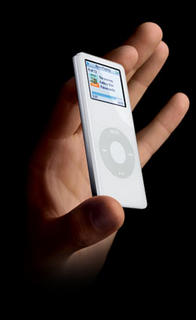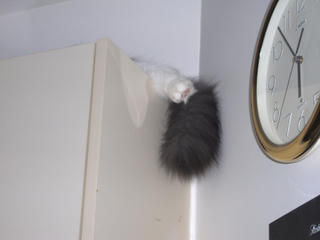The Rock
The managing director of the company, though? Not so clever. Here's what he wrote on the Company Details page of their website:
We are a company dedicated to introduce innovative new products to assist parents and carers, in daily routine activities of caring for babies and young children.
Our first of many product’s is the “Lullabub” Cot Rocker. It’s an Automatic, Remote Controlled Cot Rocking device. It simply fits under most new & existing cot’s, to sooth and settle a restless baby to sleep. Which also assist’s you at the same time.
Christopher R M Mitchell
Managing Director
Oh, Mr. Mitchell. I don't know if you're the product of a lousy school system or if you're just not a very good writer, but you really need some help. And here it is.
1) "We are a company dedicated to introduce..."? No. You can't use in the infinitive in that context--you need the present progressive "dedicated to introducing". (You can use the infinitive after a modal auxiliary if you like; "a company that wants to introduce....") "Dedicated to" is a phrase comprised of an adjective plus a preposition, so you can't use an infinitive after it because the preposition doesn't belong to the infinitive--it's already used up by the adjective. If that doesn't make any sense to you, don't worry about it; just use "introducing" and you'll be fine.
2) An apostrophe is not a warning sign; it does not indicate that an ess is about to attack. And if you're going to use it incorrectly, why not at least be consistent about it? Why should the noun "cot" take the apostrophe when the noun "product" doesn't? Why should the verb "assist" take it when the verb "fit" doesn't? At least "it's" is spelled correctly.
3) A sentence fragment. Is a chunk of a sentence. Which is not a sentence all by itself. Like "Which also assists you at the same time". Here's a hint; a sentence--that is to say, a string of words ending in a period, a colon, or a semi-colon--has to have a subject and a verb. (The string of words in question doesn't have a subject.) If you find you have a sentence fragment, you have to rewrite; either add the missing element to the fragment, or add a comma somewhere--in this instance, replace the period before "which" with a comma. Good writers get to break the rule from time to time because they know what they're doing; people who don't know what they're doing look like boobs, and are not, de facto, good writers.
+
While I'm on the subject of dumb mistakes: a few days ago I wrote about a really stupid error in Esquire magazine. I happened to see that issue on the stands today, and here's the thing I can't quite get; on the cover, "Whose Bald Spot Is It?" On the article itself, "Whose Bald Spot Is It?" And on the answers page, "Who's Bald Spot Is It?" I don't know what's worse; to have made the same mistake three times, which at least suggests a sort of foolish consistency (the hobgoblin of little minds), or to have gotten it right twice and wrong once, which means someone's really not paying attention. I suppose in retrospect the three mistakes would have been worse, because for a major magazine to put a typo on its cover--well, that's really humiliating.
+
Speaking of magazine covers, this isn't a mistake but it really threw me for a loop. The cover story of The New Republic a couple of weeks ago was about the Hurricane Katrina debacle, and the text on the cover read "Disaster and Disgrace". (See?) I don't expect everyone to know every minute aspect of pop culture, and I know perfectly well that whoever came up with the cover line was being literal, but I was mildly astonished at the inappropriate image that brought to mind, since it's the first line of the chorus of an Abba song called "The King Has Lost His Crown", about a cheated-on womanizer. There's no reason any writer should Google every phrase they coin just to see if someone's already thought of it, but was nobody on the staff of TNR even a closet Abba fan in the seventies?


